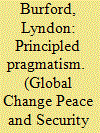| Srl | Item |
| 1 |
ID:
114435


|
|
|
|
|
| Publication |
2012.
|
| Summary/Abstract |
The funding of international nuclear risk mitigation is ad hoc, voluntary, and unpredictable, offering no transparent explanation of who is financially responsible for the task or why. Among many non-nuclear-armed states, this exacerbates a sense of injustice surrounding what they see as a discriminatory nuclear regime. The resulting erosion of the regime's legitimacy undermines support for efforts to prevent nuclear weapons dissemination and terrorism. This article proposes a transparent, equitable "nuclear-user-pays" system as a logical means of reversing this trend. This system envisions states contributing financially to international efforts to mitigate nuclear risks at a level relative to the degree of nuclear risks created by each state. "National nuclear risk factors" would be calculated by tabulating the risks associated with each state's civilian and military nuclear activities, as well as advanced dual-use and nuclear-capable missile activities, multiplying the severity of each risk by the probability of it occurring, and combining these results. A nuclear-user-pays model would create financial incentives for national and corporate nuclear risk mitigation, boost legitimacy and support for nuclear control efforts among non-nuclear-armed states, assist in preventing nuclear weapons dissemination and terrorism, and advance nuclear disarmament by helping progressively devalue nuclear weapons.
|
|
|
|
|
|
|
|
|
|
|
|
|
|
|
|
| 2 |
ID:
101831


|
|
|
|
|
| Publication |
2011.
|
| Summary/Abstract |
From 1995 to 2000, transnationally active, New Zealand non-governmental organisations and individuals influenced New Zealand nuclear disarmament policy in significant and sometimes pivotal ways. During this period, New Zealand emerged as a global norm leader, experiencing the zenith of its influence on international nuclear disarmament diplomacy. As such, the NGO activity examined here also had significant downstream effects on international political, legal and normative developments. This article broadens the body of empirical data on the work of transnational disarmament advocacy. Its findings reinforce and deepen constructivist understandings about the importance of non-traditional actors and ideational factors such as norms, identity, and ethics in the conduct of international relations.
|
|
|
|
|
|
|
|
|
|
|
|
|
|
|
|